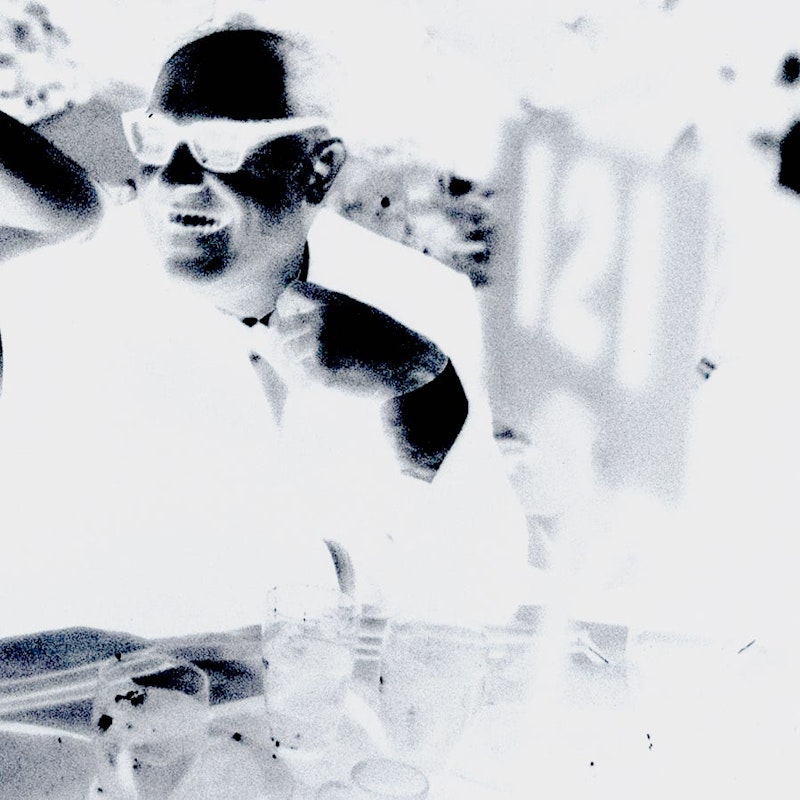While Enzo enjoyed his own Banana Law in the bathtub, Giuseppe paced around the lobby of the Hotel Pennsylvania. Their Italian connection was a no-show, and the Americans from Fangoria were nowhere to be found. The concierge assured him that the convention was still scheduled to take place later that night—delayed by half an hour, perhaps, just so everyone can make it safely through the storm—and Mr. Bucci should be downstairs in no fewer than 45 minutes. So Giuseppe had some time to kill, and because Giuseppe was a producer, he started to panic: not working and not being on your feet was anathema to the man that (according to him, at least) shouldered the burden of Enzo B. Bucci and kept him alive and solvent enough to continue drinking himself to death. The very moment Giuseppe returned to his room upstairs, Enzo was still in the bath, quoting lines from his own movie back at the tiny bathtub TV screen.
Giuseppe finally sat on the edge of his bed and put his head in his hands. “What am I going to do…?” He knew Enzo was going to die soon, and with no triumphant final act: after getting snubbed in his video store days by Enzo, Quentin Tarantino picked Lucio Fulci to champion, and it was Fulci who reaped the rewards of a lifetime spent working in a country where everyone despises you and you’re forced to make meaningless, commercial trash. Fulci only lived another decade, but he was feted as he should’ve been all along. Not Enzo.
Giuseppe looked out the window at a brick wall. He looked for the remote, and found it under the pillow. He turned on CNN and saw a report about the blizzard down in Baltimore: “The mercury plunged across many parts of the United States Saturday as winter storms swept across many areas, setting record lows in cities and towns in the Midwest, Northeast and South. Forecasters in Washington, D.C., said a storm closing in on Virginia and Maryland could be the biggest in 10 to 15 years. Predictions for the weekend vary between 1 to 3 feet of snow accumulating in the hardest-hit areas, which are expected to include Washington, D.C.; Richmond, Virginia; and Baltimore, Maryland.” Como Nueva York…?
He thought about all the work he’d been through with Enzo. The rough cut of Blood Sorcerer 2. The modest success of Coagulate in Tokyo. Banana Law bringing in royalties from German television every year, always growing. Why was he still with him? Dario Argento always kept the door open for Giuseppe to return. Enzo was a pariah in Italy, with no adopted country, and just under a year before the release of Scream, horror was a dead genre in the United States and much of the world. Giuseppe didn’t know how to make period pieces. He didn’t know how to make spy movies, thrillers. He didn’t understand courtroom movies, not even 12 Angry Men (“I still think the kid did it”).
But Enzo did. Like all of his colleagues in Italy, Enzo started directing movies in early-middle age; his teens and 20s were in law school. He read widely and kept up with popular and avant-garde cinema across the world. Despite his tragic error blowing off a young Tarantino, he could watch Pulp Fiction without being consumed by regret. It was one of his favorite films of 1994, along with Through the Olive Trees by Abbas Kiarostami and the seminal basketball documentary Hoop Dreams. He went to Pasolini’s funeral, unlike Giuseppe, who told him “the faggot got what he deserved,” and Enzo never let him forget it. They even had a moment when Bill Clinton coined “Don’t Ask, Don’t Tell”—Giuseppe had tried to move on, trying to be as politically correct as possible, but Enzo would bring it up at the worst times. Multiple meetings for multiple movies were ruined because Enzo never stopped teasing Giuseppe about saying that Pasolini was a “faggot” who got what he deserved.
Even if Enzo had a career resurgence, Giuseppe would fall apart. Enzo hated him, resented his proud ignorance and broad, bland popular taste. He hated being managed by a man who didn’t read books. And Giuseppe resented being stuck with a failure, someone who was never happy doing what he supposedly loved, wishing he was making something like India Song or The Mother and the Whore. Giuseppe remembered, one night in New York City, January 1996, when he scuppered a proposal to make a film with Enzo’s own money on black and white 16mm, in the style of Jean Eustache’s The Mother and the Whore, with the stipulation that his would be eight hours long, not just four. Giuseppe fell asleep during the meeting, and as he dozed off into a nap he didn’t mean to take, he thought about Kevin Smith’s Clerks, and wondered if Enzo was right all along.
—Follow Monica Quibbits on Twitter: @MonicaQuibbits

